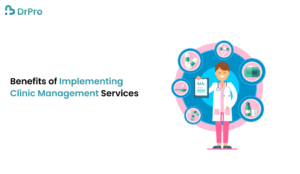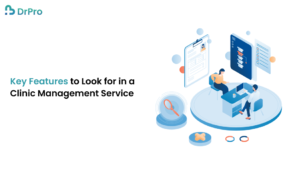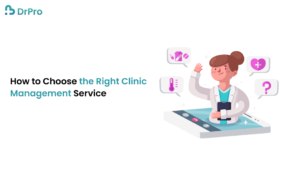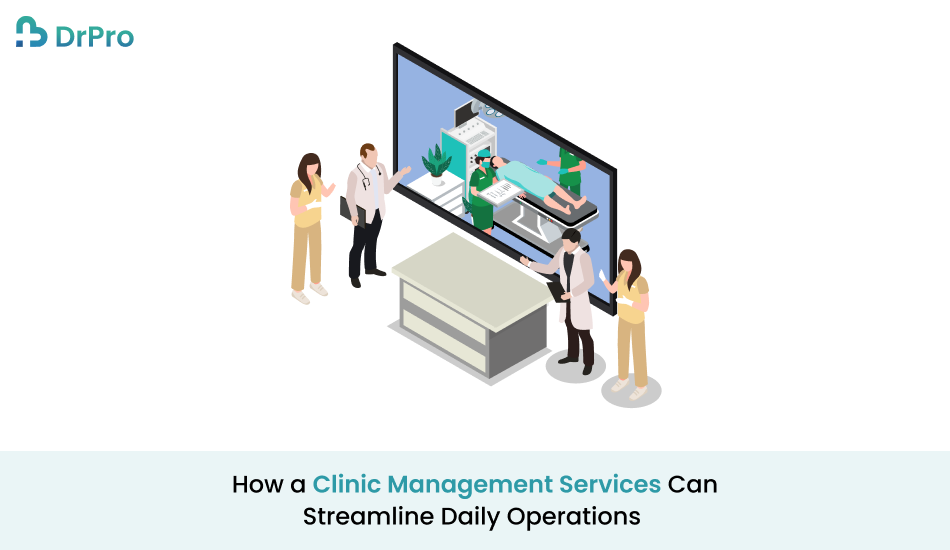Running a clinic is a difficult task. This means that the daily responsibilities include managing patient care, employees and subordinates on the staff, paperwork, and accounts, as well as attempting to optimize the workings of each section. However realizing all these is not easy since it involves the interrelation of various components, and one remedy that can make all these come to life is a Clinic Management Service (CMS).
In this article, I am going to explain what a CMS is as well as how it could be beneficial to your clinic, and what to look for when selecting one. We will also give guidance on how to make the best out of CMS and how to select a proper system for your clinic.
What Are Clinic Management Services?
A Clinic Management Service (CMS) is an application that has been developed with a view to automating clinical processes including the management processes in a clinic. Clinic Management Service can assist in many of patients’ registration and appointment booking, and billing and inventory processes, which take much time and energy daily.
It shows that clinics can increase their efficiency by using Clinic management services decrease manual mistakes, and increase the level of patient satisfaction. Due to centralization, it becomes easier to integrate main processes into one system and facilitate communication between workers, patients, and other clients. Clinic staff is, therefore, able to spend more time and energy on other important and useful uses that are rarely achievable due to time limitations.
Benefits of Implementing Clinic Management Services

1. Improved Efficiency and Time-Saving
Everyone knows that one of the charms of a Clinic Management Service is the ability to handle a lot of paperwork. For instance, there are problems with the appointment scheduling, and patients’ registrations and assiduity; The clinical record is also in electronic forms and can be retrieved easily. Staff say the convenience is phenomenal: the one click of the button opens up the possibility of a patient’s information, medical history, and reports. This saves time which could have been used to input the data manually and also eliminates the chances of making many mistakes.
A good CMS also helps to prescribe timely reminders for patients to show up as well as to shorten the time taken in billing or insurance claims. Such efficiency in business processes can serve as massive for the improvement of productivity within your clinic and your employees can get back to what they do best – giving care.
2. Enhanced Patient Experience
Today’s healthcare market conditions require a focus on patient satisfaction. Therefore, clinics can use a Clinic Management Service to give patients a much more efficient and pleasant process. For example, through online appointments, patients can fix up their appointments by sitting in the comfort of their homes without having to spend time on the phone. Moreover, it also helps the clinic and patient avoid missed appointments due to a reminder system that is implemented automatically.
The patients also find the feature, where patients can view their records and test results, as well as prescriptions, are also highly valued for better communication with the healthcare provider. This makes confidence be developed and patients are assured that they are fully involved in the entire process of healthcare consumption.
3. Reduced Errors and Improved Accuracy
Documentation on paper is very dangerous because a slight mistake made while entering a patient’s record may be very costly. In this case, Clinic Management Service cuts on the possibility of entering wrong data since patient’s records are digital. All the information of the patient is centralized and updated in real-time so it is easier to get accurate information at the time of decision-making, which will definitely enhance the quality of decisions made by the medical staff further improving the health of the patients.
There are a few problems with billing – misunderstandings may happen that result in financial discrepancies or delayed reimbursement. A Clinic Management Service can help in billing by providing correct charges as well as insurance claims. It assists clinics in averting probably expensive errors, and the health of the practice’s financial structure is boosted.
4. Better Financial Management
Clinic Management Services also assist clinics that use them to have better control over their financial aspect. With billing, payment tracking, and financial data processing being integrated into CMS, clinics are better placed to run their revenue cycle. For example, it offers information concerning payments, patients, balances, and even unpaid claims. This visibility can assist in solving a problem of large aggregate outstanding debt by making sure the clinic gets paid before it can carry out another service.
Furthermore, most Clinic Management Services have built-in accounting functionalities whereby clinics can track their expenditures, create accounts and balance sheets, and monitor cash flow, which gives the clinic better insight into the clinic’s financial position.
5. Compliance and Data Security
There are a lot of legal issues in the healthcare sector and over the industry rules like HIPAA are paramount. A good Clinic Management Service will assist clinics to meet these regulations, through storage and management of patients’ data in a legal way. Due to such enmities as secure access control, encryption, and audit trails, CMS guarantees that the patient’s data is protected and that the clinic complies with all the stipulated measures on data protection plans.
Key Features to Look for in a Clinic Management Service

When choosing a Clinic Management Service, one has to be careful and choose one that caters to your clinic’s needs. Here are some essential features to consider:
1. Appointment Scheduling and Patient Management
Another thing that is very important in any CMS is the feature of appointment scheduling. Search for an appointment system that will allow patients to book appointments on their own, notify patients about their appointments, and also allow staff to manage appointments. In some of them, it is even possible to track a waiter’s availability and manage the waiting list with its help.
2. Electronic Health Records (EHR)
The modern clinic cannot work without an integrated EHR system. A CMS should be able to help you keep and organize the patient’s history and records, test results, and prescriptions, among others. It should enable one to assess patient details, modify files, and interact with other healthcare providers where needed.
3. Billing and Payment Processing
Some of the functionalities that should be provided by the CMS are the following: automated billing, insurance claim submission, and payments. Insurers should also be easily incorporated into the system, and payment options should also be diversified, which will assist in the collection of payments and efficiency in tracking financial activities.
4. Inventory Management
Stock control becomes important in a clinic so that proper stock of health products and equipment, medicines among other related items is maintained. Having an inventory management feature in your Clinic Management Service will allow you to manage stock by monitoring usage or consumption levels and ordering supplies on your behalf instead of keeping records on the status of your inventory.
5. Reporting and Analytics
A good and strong Clinic Management Service should be able to offer reports and analysis where users get comprehensive clinic reports, patient behaviors, revenue, and expense reports among others. They can be very useful in strategic management when it comes to the decision-making of a business and recognizing definitive areas
6. Integration with Other Systems
Your CMS should be capable of interfacing with other software systems like accounting software, electronic prescription, and laboratory software. It means that all of your clinic’s processes operate in harmony and eliminate the need to enter information into multiple systems.
How to Choose the Right Clinic Management Service

Choosing the most appropriate Clinic Management Service for your clinic is among the biggest determinations that can have a major impact on the clinic. Here are some factors to keep in mind:
1. Size and Needs of Your Clinic
It is important to think about the scale of your clinic as well as particular demands your clinic might have. For a small clinic, with hundreds of patients a basic CMS, containing the basic options will be enough. However, the clinic with many departments will benefit from a better system with many more functionalities like having the ability to manage several clinics at once and have autonomous procedures depending on the department.
2. User-Friendly Interface
A Clinic Management Service should easily be navigated through even by professionals with no ICT background among your staff. When selecting the system, pay much attention to its user interface, and provide some orientations on using the system.
3. Cost
Again, cost plays a major role; however, you should think about whether the CMS itself will add value to your clinic. Check where you will use these functionalities to do it faster, avoid mistakes, or deliver better patient care. If you wait and buy a system that costs a little more, but is much better you’ll be glad when it finally arrives.
4. Customer Support
This is why you should go for the top 10 Clinic Management System in 2025 provider that provides top-notch customer support. Having a dependable help desk is always beneficial in times when anything goes wrong or when you need help with a software update. Ensure you have a list of providers with a good customer service section and who provide availability such as 24/7.
5. Reviews and Recommendations
Before choosing a Clinic Management Service, check out the testimonials from other clinic managers and staff who used the particular system. The scariest thing of all is, that the rantings of the users on their complaints about the system may contain valuable information about the positive aspects as well as the faulty ones. You can also consult your fellow healthcare workers to know about what practices they are using with success or unsuccessfully.
Enhance Your Practice with Clinic Management Service
There are specific operational changes that can be given as a reason for adopting CMS, but more than that, a Clinic Management System results in a better environment for patients and employees. With task automation, better communication, and innovative ways of patient care, CMS makes your clinic’s daily functioning more efficient.
The subsequent is the admitted benefits of choosing the right CMS and applying it to the clinic’s operating procedure to increase organizational effectiveness, minimize mistakes, improve clients’ satisfaction, and financial control. This frees your time so you can instead concentrate on the single most important aspect of your job – patient care.
Conclusion
Clinic Management Systems are slowly turning into indispensable tools for practicing healthcare facilities. It is used to assist the clinics in providing the right care, most efficiently and in a way that reduces the hassle of paperwork. Most of these ideas are aimed at improving the general work of your clinic through the automation of mundane tasks and integration with key systems into a single tool – CMS.
These considerations include the size and requirements of a clinic and cost, as well as advanced options such as scheduling billing and EHR. The best system for your clinic will not only help reduce inefficiency but also raise the level of satisfaction of your clients.
FAQs
Q1. What is a Clinic Management System?
A Clinic Management System (CMS) is a software platform that helps manage a clinic’s daily operations, including scheduling, billing, patient records, and inventory management.
Q2. How can a CMS improve patient satisfaction?
By automating appointment scheduling, sending reminders, and providing patients with easy access to their medical records, CMS helps create a smoother and more convenient experience for patients.
Q3. What should I look for in a Clinic Management Service?
Look for features such as appointment scheduling, electronic health records (EHR), billing integration, inventory management, and reporting capabilities
Q4. Is it difficult to transition to a Clinic Management Service?
With the right training and support, transitioning to a CMS can be straightforward. Many systems offer user-friendly interfaces to make the transition easier for staff.
Q5. How much does a Clinic Management Service cost?
The cost of a CMS varies based on the size of the clinic, the features included, and the provider. It’s important to consider the system’s long-term value when evaluating cost.


